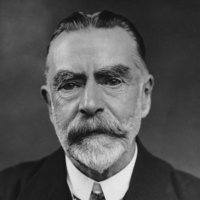The Burdened Ass
(AN ALLEGORY)
One day, as I travelled the highway alone,
I heard, on in front, a most dolorous groan;
And there, round the corner, a weary old ass
Was nuzzling the hedge for a mouthful of grass.
The load that he carried was piled up so high
That it blocked half the road and threatened the sky.
Indeed, of himself I could see but a scrap,
And expected each minute to see that go snap;
For beneath all his load I could see but his legs,
And they were as thin as the thinnest clothes-pegs.
I said, “O most gentle and innocent beast,
Say,—why is your burden so greatly increased?
Who loads you like this, beyond reason and right?
Is it done for a purpose, or just out of spite?
Is it all your own treasures you have in your pack,
That crumples your backbone and makes your ribs crack?
It is really too much for an old ass’s back.”
“Treasures!”—he groaned, through a lump of chewed grass,
“Are they treasures? I don’t know. I’m only the ass
That carries whatever they all like to pack
On my load, without thought of my ribs or my back.
I know there are heaps of things there that I hate,
But it’s always been so. I guess it’s my fate.”
And he flicked his long ears, and switched his thin tail,
And rasped his rough neck with a hinder-foot nail.
“There are fighting-men somewhere up there, and some fools,
And talking-men—heaps—who have quitted their stools
To manage the state and direct its affairs,
And see, I suppose, that we all get our shares,—
And ladies and lords, and their offspring and heirs,
And their flunkeys and toadies, and merchants and wares.—
And parsons and lawyers,—O heaps,—in that box,
And big folk and small folk, and all kinds of crocks.
”That mighty big bale?—Poison, that,—for the people;
Whatever else lacks they must still have their tipple.
That’s The Trade, don’t you know, that no one can shackle,—
'Vested Int’rests,' they call it, and that kind of cackle.
Why the Bishops themselves dare not tackle the tipple,
For it props up the church and at times builds a steeple.”
(A strangely ingenuous old ass, you perceive,
Whom any shrewd rascal could easily deceive.)
“That other big bale?—What I said,—fighting things,—
Ammunition and guns and these new things with wings,
O yes, they bulk big, but we need them,—for why?—
If we hadn’t as much as the others have—why,
They say we might just as well lie down and die.
”Yon big bale on top?—Ah! that is a big weight.
And that’s just the one of the lot I most hate.
That’s Capital, that is,—and landlords and such;
And there seems to me sometimes a bit over-much
In that bale. But there,—I’m perhaps wrong again,
Such matters are outside an old ass’s ken.
“My fodder? Oh well, you see,—no room for that.
I pick as I go, and no chance to get fat.
That poison bulks large,—and the landlords, you see;—
And that Capital’s heavy as heavy can be.
Some one’s bound to go short, and of course that one’s ME.”
He kicked up one heel with a snort of disgust,
And—sudden as though by a giant hand thrust,
The top-heavy pack on his lean back revolved,
Came crashing to earth, and in fragments dissolved.
Much surprised,—the old ass, thus set free from his load,
Picked out a soft spot in the nice dusty road,
And laid him down on it and rolled in high glee,
And, as he kicked this way and that, said to me,—
“Say, Man, I have never enjoyed such a roll
Since the day I was born, a silly young foal.
Seems to me, if I’d had half the sense of an ass,
I’d have long since got rid of that troublesome mass.
But now that it’s down, why—down it shall stop.
All my life’s been down under, but now I’m on top.”
Then he came right-side up, pranced about on his load,
And kicked it to pieces all over the road.
And what all this means, I really can’t say.
It may not mean much. But—again,—why, it may.

